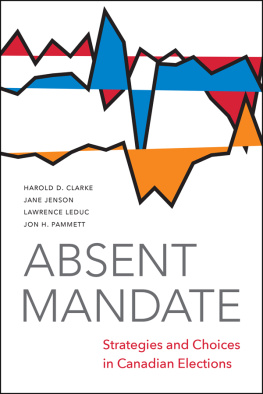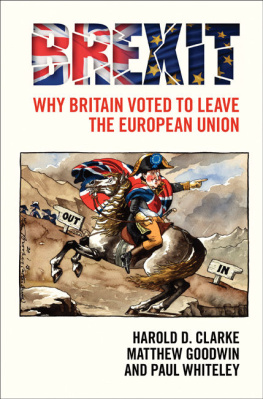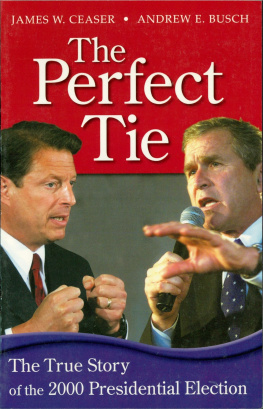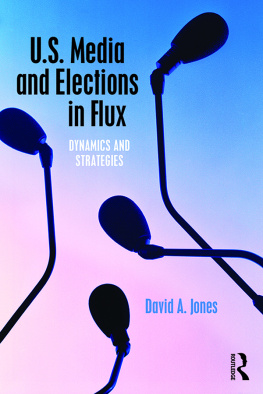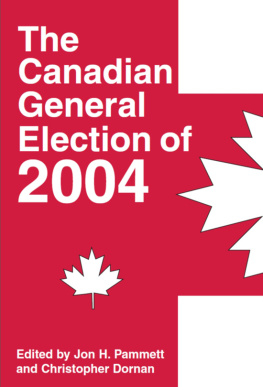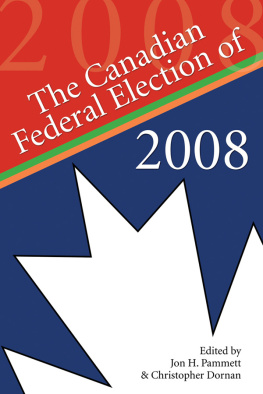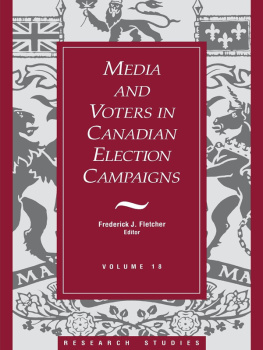
ABSENT MANDATE
Strategies and Choices in Canadian Elections

University of Toronto Press 2019
TorontoBuffaloLondon
utorontopress.com
Printed in Canada
All rights reserved. The use of any part of this publication reproduced, transmitted in any form or by any means, electronic, mechanical, photocopying, recording, or otherwise, or stored in a retrieval system, without prior written consent of the publisheror in the case of photocopying, a licence from Access Copyright (the Canadian Copyright Licensing Agency) 32056 Wellesley Street West, Toronto, Ontario, M5S 2S3is an infringement of the copyright law.
Library and Archives Canada Cataloguing in Publication
Title: Absent mandate : strategies and choices in Canadian elections / Harold D. Clarke, Jane Jenson, Lawrence LeDuc, and Jon H. Pammett.
Names: Clarke, Harold D., author. | Jenson, Jane, author. | LeDuc, Lawrence, author. | Pammett, Jon H., author.
Description: Includes bibliographical references and index.
Identifiers: Canadiana 20190094052 | ISBN 9781487594817 (hardcover) | ISBN 9781487594800 (softcover)
Subjects: LCSH: Elections Canada History 20th century. | LCSH: Elections Canada History 21st century. | LCSH: Voting Canada. | LCSH: Political participation Canada.
Classification: LCC JL193 .C53 2019 | DDC 324.97107 dc23
We welcome comments and suggestions regarding any aspect of our publicationsplease feel free to contact us at or visit our internet site at utorontopress.com.
| North America | UK, Ireland, and continental Europe |
| 5201 Dufferin Street | NBN International |
| North York, Ontario, Canada, M3H 5T8 | Estover Road, Plymouth, PL6 7PY, UK |
| ORDERS PHONE : 44 (0) 1752 202301 |
| 2250 Military Road | ORDERS FAX : 44 (0) 1752 202333 |
| Tonawanda, New York, USA, 14150 | ORDERS E - MAIL : |
| ORDERS PHONE : 18005659523 |
| ORDERS FAX : 18002219985 |
| ORDERS E - MAIL : |
Every effort has been made to contact copyright holders; in the event of an error or omission, please notify the publisher.
This book is printed on paper containing 100% post-consumer fibre.
University of Toronto Press acknowledges the financial assistance to its publishing program of the Canada Council for the Arts and the Ontario Arts Council, an agency of the Government of Ontario.

Contents
Absent Mandate: Strategies and Choices in Canadian Elections continues the tradition of three earlier editions of Absent Mandate , published in 1984, 1991, and 1996, respectively. Although they all carry the same main title, each has provided new analysis to accommodate the changing political realities and economic circumstances of the times. The dominant theme of each volume is reflected in the different subtitles: The Politics of Discontent in Canada ; Interpreting Change in Canadian Elections ; Canadian Electoral Politics in an Era of Restructuring. This book revisits the Absent Mandate themes twenty years after the last one bearing the title, in light of the elections held during the Chrtien, Martin, and Harper years in power and including developments after the 2015 election. Although we focus mainly on federal elections held between 1993 and 2015, we also compare these more recent patterns of voter and party behaviour to those observed in elections since 1965.
The team of authors which produced the three previous editions of Absent Mandate had earlier provided the first comprehensive book based on the Canadian election studies: Political Choice in Canada (1979). That book analysed Canadian data on the most basic subject of election studies scholarship around the world namely, how do voters decide? This first question involved the interplay of important factors in the voting decision, particularly psychological attachments to political parties, attitudes towards political leaders and candidates, and the effect of different kinds of election issues. The book also addressed a second basic question in election analysis: what decides elections? The analysis showed that vote flows over the electoral cycle, including conversion from one party to another, new and transient voters behaviour, and abstentions, were all factors involved in producing an election outcome.
The authors were concerned, however, to include a third question that motivated the Absent Mandate books: what do elections decide? Unlike the first two questions, this one was seldom addressed in election studies. Yet the idea of a mandate is fundamental to the theory of democratic elections, implying as it does that political parties will present their prospective ideas and policies during a campaign, the public will decide based on those proposals, and the election winners will then enact them. As the book title signals, the authors concluded that Canadian elections do a poor job of providing policy mandates to incoming governments or of allowing clear accountability for government actions. Instead, election campaigns are dominated by discussion of broad national problems, short-term quick fixes, and the capabilities of the party leaders.
Testing that argument with more than twenty years of new national survey data collected during the seven federal elections held between 1993 and 2015 was our main reason for undertaking this new edition. We sought to identify and track over time whether there were processes still driving both parties and voters away from behaviour that accords with the norms of democratic theory. As before, we found that parties do not campaign on clear policy alternatives. Negative and personalized campaigns are the norm a pattern even more prevalent today than in the past. Voters, in turn, typically use elections to express discontent, rather than to support specific policy directions, and their support for a particular party, leader, or candidate cannot be taken for granted from one election to the next. Hence election campaigns are volatile, outcomes are often unpredictable, and true policy mandates are mostly absent.
A central argument of Absent Mandate: Strategies and Choices in Canadian Elections is that voters and political parties both operate in a brokerage mould during election campaigns. Discussion of basic policy alternatives is typically absent from these campaigns, and voters are unlikely to use elections to guide the parties to their preferred course of action in important economic, social, environmental, or other domains. Indeed parties and voters learn from each other that short-term electoral strategies and shifting coalitions of support mean that policy discussion is likely to be of the most general sort, that performance is what shapes choice, that negative campaigning is the norm, and that discontent often drives the vote. This book shows that, even as the new Conservative Party of Canada was created by a merger of the Progressive Conservative Party and Canadian Alliance in 2003 as a right-of-centre alternative to the Liberals, its electoral programs and behaviour were in keeping with the prevalent norms of the brokerage mould. The new Conservatives identified general problems, proposed narrow, quick-fix solutions, and denigrated the leaders of other parties. For their part, in 2015 the New Democrats and Liberals said they represented Change You Can Trust and Real Change, respectively, but it was far from clear what specific policy directions they would take to address the nations important economic, societal, and environmental problems. In summary, there is a great deal of continuity in the patterns of behaviour of voters and parties in Canadian federal elections, despite changes in party names and stances on key issues.
Next page
